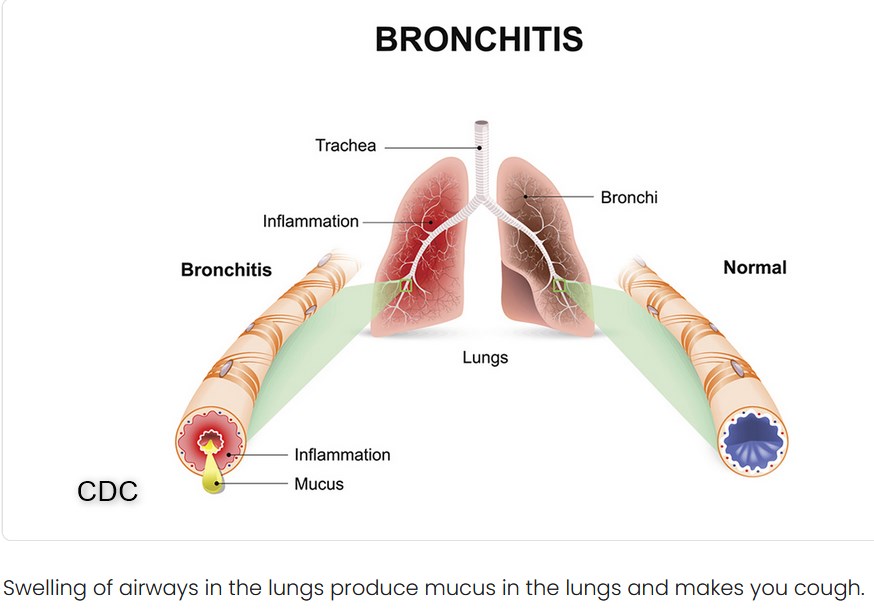A health expert weighs in with answers on the big questions from 2024
Writers often wonder how to pick topics that matter to people. As a columnist, I want to cover health issues that really interest our readers.
There are a few good ways to do this. One way is to see which topics people search for most on Google. I used this question method, came up with 10 of the most Googled health questions, and added the answers.
- Is bronchitis contagious?
Bronchitis happens when the bronchial tubes, which move air to and from your lungs, become inflamed. Acute bronchitis is contagious because it is most often caused by viruses that spread easily from person to person. The risk of transmission is highest during the first few days of symptoms and may last for about a week. Chronic bronchitis, which is a long-term condition commonly associated with COPD, is not considered contagious.

- How long does the flu last?
The flu usually lasts about 5 to 7 days. Symptoms tend to show up one to four days after exposure to the virus. The worst symptoms, like fever and body aches, are often at their worst in the first two or three days. Some people might need more time to totally recover, with tiredness or a nagging cough sticking around for up to two weeks. Getting a flu shot might make it less severe and go away faster.
- What is Lupus?
Lupus is a long-term autoimmune disease where the immune system accidentally attacks healthy cells and tissues. Lupus leads to inflammation and can harm different body parts, such as the joints, skin, kidneys, heart, lungs, and brain. There are several forms of the disease, with Systemic Lupus Erythematosus (SLE) being the most common and severe.
Symptoms of lupus can differ greatly from person to person and may include the following:
| Painful or swollen joints | Extreme tiredness |
| Fever | Hair thinning or loss |
| Sensitivity to sunlight | Chest pain |
| Dry eyes and mouth | Memory loss or confusion |
| Skin rashes |
- Is Strep Throat Contagious?
Strep throat spreads quickly from one person to another. The responsible bacteria, group A Streptococcus, can be passed to others by respiratory droplets or direct contact.
Here are some common ways it spreads:
- Breathing in droplets when an infected person coughs, sneezes, talks, or sings.
- Touching a surface or object with the bacteria on it, then touching your mouth or nose.
- Coming into contact with skin sores caused by the infection.
- Sharing silverware, cups, or plates with someone who has the bacteria.
The infection becomes contagious during the incubation period, usually two to five days after exposure—even before any symptoms show up.
Without treatment, someone with strep throat can spread the bacteria for two to three weeks. However, starting antibiotics reduces contagiousness significantly, usually within 24 to 48 hours.

- How much water should you drink a day?
The quantity of water needed each day can vary from person to person. According to Harvard’s The Nutrition Source, general recommendations for fluid intake are:
- Men: About 13 cups (104 ounces) or approximately eight water glasses of water/fluids per day.
- Women: About 9 cups (72 ounces) or approximately six water glasses of water/fluids per day.
These amounts include all fluids consumed, with roughly 20 percent coming from food and the rest from drinks.
- What causes high blood pressure?
Primary, or essential hypertension, develops over time and usually has no definite cause. The following variables are linked to this condition:
- Family History: A parent or sibling with high blood pressure increases your likelihood of developing it.
- Age: The risk of high blood pressure increases as you grow older.
- Race: High blood pressure is more common and often develops earlier in Black individuals.
- Obesity: Excess weight can affect blood vessels, kidney function, and other systems, contributing to higher blood pressure.
- Physical Inactivity: A lack of regular exercise can lead to weight gain and higher heart rates, which might raise blood pressure.
- Diet: Eating too much salt and not enough potassium can increase blood pressure.
- Tobacco Use: Smoking or vaping can cause an immediate spike in blood pressure and damage blood vessel walls.
- Alcohol Consumption: Consuming large amounts of alcohol, especially in men, is linked to higher blood pressure.
- Chronic Stress: Prolonged stress can temporarily increase blood pressure levels.
Secondary hypertension is caused by underlying conditions including:
- Kidney disease.
- Thyroid disorders.
- Tumors in the adrenal glands.
- Obstructive sleep apnea.
- Certain medications, such as pain relievers, decongestants, or birth control pills.
- Illegal drugs such as cocaine or amphetamines.
- Congenital heart defects.
Additional causes may include pregnancy, conditions like diabetes, or environmental factors.

- How do I lower cholesterol?
Improve Your Diet
- Eat more foods with soluble fiber, like oats, barley, beans, apples, and citrus fruits.
- Eat more fatty fish such as salmon to increase your intake of omega-3 fatty acids.
- Eat unsaturated fats found in olive oil, nuts, and seeds.
- Cut back on fatty meats, butter, cream, and hard cheeses.
Exercise Regularly
- Get at least 150 minutes of moderate aerobic activity each week.
Maintain a Healthy Weight
- Losing extra weight can help reduce cholesterol levels.
Quit Smoking
- Smoking lowers good cholesterol (HDL), raising heart disease risk.
Limit Alcohol
- If you drink, drink moderately.
Consider Fiber Supplements
- Supplements like psyllium can offer additional soluble fiber to support better cholesterol levels.
- What causes kidney stones?
Kidney stones are clusters of crystals that form when minerals and other substances in the urinary system stick together. While most stones pass naturally through urination, the process of passing kidney stones can be extremely painful.
Urine contains various components, such as minerals, acids, calcium, sodium, oxalate, and uric acid. If these particles are present in high amounts, and there’s not enough liquid in the urine, they can combine to form crystals, eventually developing into kidney stones. This process can take months or even years.
Risk factors for kidney stones
Certain factors increase the likelihood of developing kidney stones, including:
- Not drinking enough water.
- Eating a diet high in meat or protein-rich foods.
- Consuming foods high in sodium or sugars like sucrose and fructose.
- Taking vitamin C supplements.
- A family history of kidney stones.
- Urinary tract blockages.
- A history of stomach or intestinal surgery, such as gastric bypass.
- Using specific medications, including some diuretics, calcium-based antacids, antiseizure drugs and others.
Medical conditions linked to kidney stones are cystic fibrosis, diabetes, gout, high blood pressure, obesity, and osteoporosis.
- Why do I have a headache?
Headaches can happen for many reasons. Some of the most common causes include:
- Stress and tension: Stress can tighten muscles in your head, neck, and shoulders, producing tension headaches.
- Poor posture: Slouching or improper neck and spine positioning can strain muscles and cause pain that goes to your head.
- Dehydration: Not drinking enough water can impact blood pressure and cause headaches.
- Diet factors: Missing meals, certain foods, additives, or caffeine withdrawal can all act as triggers.
- Sleep issues: Too little sleep or sleeping too much (over 8 hours) can bring on headaches.
- Environmental triggers: Bright lights, loud sounds, or strong smells, like perfumes, can cause headaches.
- Alcohol: Beverages like red wine can trigger headaches.
- Underlying health conditions: In some cases, headaches may be a symptom of other issues, such as sinus problems, infections, or high blood pressure.
If your headaches are frequent, severe, or have unusual symptoms, consider seeing a healthcare provider for an accurate diagnosis and treatment options.
- Is Pneumonia Contagious?
Pneumonia is a lung infection that occurs when germs enter the airway, travel to the lungs, and settle in the air sacs. If the immune system cannot get rid of these germs quickly, the air sacs can become inflamed and fill with pus and fluid.
In the United States, the most common cause of pneumonia is a type of bacteria known as pneumococcus. While pneumonia itself is not contagious, the bacteria and viruses that lead to it can spread from person to person. Being exposed to the germs does not guarantee you will develop pneumonia. Your immune system’s ability to fight off the infection is key. Even if you don’t get pneumonia after exposure, you can still pass the germs to others (Pacific Lutheran University and Mackenzie Bean, Becker’s Health It).





















